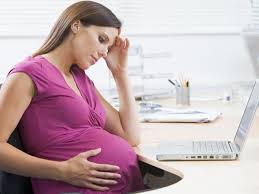It is funny because most times when people mention depression in relationship to pregnancy they are talking about the baby blues or that time after a woman has a baby when she may feel an overwhelming bout of depression. But what many people do not talk about is depression DURING pregnancy. About one in ten women experience random bouts of depression throughout their pregnancy.
The Symptoms of Depression
Depression can be a little obscure or full blown and obvious. If you are experiencing three or more of the following for more than a week, then you may be experiencing depression:
- Fatigue and trouble sleeping combined with feelings of hopelessness and sadness
- Lack of concentration
- Going through most of the day feeling sad and blue
- Just not enjoying anything you normally would enjoy
- Never-ending fatigue
- A desire to eat all the time or just not wanting to eat at all
If you have thoughts of hurting yourself or your symptoms prevent you from doing your daily activities then you should seek immediate medical attention. You can ask your doctor, midwife, or doula for a referral to a psychologist or psychiatrist. Most health insurance has coverage for this.
The Symptoms of Anxiety
Anxiety brings with it very troublesome symptoms that are pretty easy to spot:
- Sweaty palms
- A sudden feeling like your heart is racing
- Breathlessness (not brought on by exercise)
- Feeling like you are about to pass out or have a heart attack
- Lightheadedness
- A continual feeling that something bad is about to happen
Risk Factors for Depression
I am convinced that many times women who are expecting a child can try to hide the fact that they have feelings of depression because most people around them automatically assume that they should feel happy. It is like it is expected that you will feel this, well – joy. But, many women do not feel joyful while carrying their child and many factors can cause this to be so:
Hormonal changes – Hormones fluctuating can result in feelings of depression both during and after pregnancy. Doctors used to believe that pregnancy hormones protected women from depression but that is just not true for every woman.
You or a family member experiences depression – If you have a history of depression or someone in your immediate family does, you may be more susceptible to depression during pregnancy.
An unplanned pregnancy – Discovering you are pregnant at a time when you just started a new job, when you already have other young children you are raising, you are in a difficult or abusive relationship, at a time when finances are tight, or if you are single can be a bit much. This can result in you suddenly worrying about everything imaginable and many women can experience a heightened level of anxiety, stress, and yes – depression.
Previous miscarriage or fertility treatments – If you have experienced a prior miscarriage then the likelihood of you feeling apprehensive and stressful is higher. Same thing for fertility treatments because that process in and of itself is stressful and emotional. Either way you could feel terrified that you may lose the baby you are now carrying and this can result in anxiety and depression.
A stressful life – If you are living an already super-stressful and busy life, adding pregnancy to the mix can seem quite overwhelming. Enough said.
Ways to Combat Depression
 Put yourself first – I raised four children pretty much by myself. I married a man who was very abusive and who, although he came from a well-to-do family, eventually became a cocaine addict. So after 7 years of turmoil we divorced and I raised the children. I learned early on that if I took care of myself then I could take care of my children and everything else in my life. I was happier and better able to deal with various challenges. You have to make time for yourself on a regular basis. Many married women only get a babysitter when they want to go out on a date with their husbands but having the ability to get away from everyone and concentrate on yourself is just as important. Things like spending a day with friends, going on a long walk at a park, getting a nice long massage, going to work out and getting in the hot tub and spa afterwards, or even taking a long hot bath are all great ways to create some “me” time. Bubble baths were my thing for years because I could not afford much else. So I kept a huge luxury basket that I kept filled with nice bubble baths, soaps, bath salts, candles, facial masks, incense, loofahs, etc. and I made a point to add nice items on a regular basis. So when I put the kids to bed, I had my spa time at home with no interruptions. Eventually, working out and getting regular massages were added to the mix.
Put yourself first – I raised four children pretty much by myself. I married a man who was very abusive and who, although he came from a well-to-do family, eventually became a cocaine addict. So after 7 years of turmoil we divorced and I raised the children. I learned early on that if I took care of myself then I could take care of my children and everything else in my life. I was happier and better able to deal with various challenges. You have to make time for yourself on a regular basis. Many married women only get a babysitter when they want to go out on a date with their husbands but having the ability to get away from everyone and concentrate on yourself is just as important. Things like spending a day with friends, going on a long walk at a park, getting a nice long massage, going to work out and getting in the hot tub and spa afterwards, or even taking a long hot bath are all great ways to create some “me” time. Bubble baths were my thing for years because I could not afford much else. So I kept a huge luxury basket that I kept filled with nice bubble baths, soaps, bath salts, candles, facial masks, incense, loofahs, etc. and I made a point to add nice items on a regular basis. So when I put the kids to bed, I had my spa time at home with no interruptions. Eventually, working out and getting regular massages were added to the mix.
Exercise – Most women who are pregnant are able to do some exercise during pregnancy. Aerobic exercise and even yoga are shown to be uplifting. Many communities now offer various pregnancy yoga classes so definitely something to consider.
Ask for help – Whatever you do, do not try to play superwoman. If you are single and need help getting ready for your new baby then ask friends and family to help you. If you are starting to feel overwhelmed about caring for your first child and wonder if you will be able to function with very little sleep – ask for help. Sit family and friends down and ask them if they can commit to helping and ask what they are comfortable doing. Someone may not want to handle a new baby but would love to handle grocery shopping, cleaning, or running errands. Just ask. You may be surprised at how many people around you are willing and even WANT to chip in (even co-workers). Even if you are married, your husband may travel or work a lot so you still will need to get some assistance. Many woman may feel like they are admitting they are somehow incompetent if they ask for help but to me it says you are smart and realistic and you know how to plan ahead. And many men will try to make you feel guilty about asking for help – so don’t let them. Most men are completely clueless about what it takes to carry a child and how much work it is to care for a baby so keep this in mind.
Peppermint oil – Peppermint oil is one of the most uplifting and mood-enhancing essential oils on the planet. Essential oils have the ability to affect our psyche and emotions. Keep some with you and put a few drops on a tissue and breath in throughout the day. Use in a diffuser and diffuse in your home or office. You can make a wonderful spray by filling a spray bottle with water and adding 15 – 20 drops of peppermint oil and spraying it in the room.
Talk to a friend or relative – Sometimes just taking the time to talk to someone helps you to put things in perspective. This is not the time to isolate yourself. This is also a good way to get advice, vent, or come up with solutions to things you thought would be insurmountable problems. No one to talk to? Try journaling. You would be surprised the wonderful effect writing out your feelings on paper has. Just buy a nice spiral notebook or tablet and write whenever you feel the need to.
Get regular massage – Regular, skilled, massage therapy can relieve depression and anxiety by directly affecting the body’s complex biochemistry. In addition, massage increases dopamine and serotonin which are neurotransmitters in the body that reduce depression. Most clients who get regular massage report an overall feeling of wellbeing.
Seek professional help if moderate to severe – If you are experiencing moderate or even severe symptoms of depression and/or anxiety, the first thing you need to do is talk to your physician, obstetrician, midwife, or doula. Ask them for a referral to a psychologist or psychiatrist and make an IMMEDIATE appointment.
admin
Latest posts by admin (see all)
- Prenatal Massage Is a Gift to Your Growing Baby - December 3, 2024
- How Prenatal Massage and Hot Stone Therapy Can Help Alleviate Lower Back and Hip Pain - November 1, 2024
- Prenatal Massage in Area Spas - October 17, 2024

